If you are planning to take your first step in your investment journey then you are at the right place. Everyone wants to be rich but most of people do not know much about investment. Unlike before, today we have a huge wealth of information over the internet. There are dedicated investment-related websites and blogs. There are numerous experts on different social media platforms who can guide you in learning how to invest. But, the major challenge is where to begin and which source to trust. This article will guide you with a well-researched list of the best investment websites for beginners in 2024 so that you can start your journey without ambiguities.
These investment websites provide you with the right tools and knowledge necessary to make informed investment decisions and effectively utilize their platforms. From educational materials to robo-advisors and trading simulators, an ideal investing website offers a multitude of valuable features. Let’s see some of the best investment websites tailored for beginners and grasp how to leverage them efficiently. But before we head-start, Let’s see how to select the best platform.
What Are Investment Websites?
Investment Websites serve as a means for individuals to acquire securities like bonds, ETFs, and stocks offering a valuable avenue for achieving financial objectives. Whether it is saving for specific goals such as building wealth or a child’s education over time, brokerage accounts are versatile. In addition to the primary function of facilitating investments and savings, these accounts often provide supplementary features, including access to research reports and various tools.

While an investment website allows you to withdraw funds at your discretion, it’s crucial to note that any gains on your investments may incur taxes, depending on your income.
Selecting The Right Investment Websites For Beginners
While there isn’t an all-purpose broker or investment website, certain crucial factors should guide your decision when selecting a stock broker for beginners.

- Cost Structure: For beginners, the ideal brokerage accounts impose no commissions on online stock and ETF trades, which are typically the focus. However, be aware that some brokers may charge commissions or fees for more intricate transactions like options trading, mutual funds, and other products.
- Account Minimums: Consider the minimum deposit requirement some stock brokers may have, ranging from $5 to $500 and sometimes even for free. The best investment accounts, in our view, eliminate account minimums. It’s worth noting that a few brokers may not permit fractional share investing, so ensure you have enough funds to acquire at least one share of an ETF or stock. Opt for low brokerages that enable anyone, even with limited capital, to initiate their investment journey.
- Diversification of Funds: For many, delving into individual stocks, especially for beginners, might not be the optimal choice. The preferred investing platform for beginners should provide access to low-cost exchange-traded funds and fee-free mutual funds, offering a smart investment approach without necessitating an extensive understanding of the stock market.
- Account Options: When selecting stock brokers, you have the option of a cash account or a margin account:
- Cash account: You can use only the money available in your account.
- Margin account: Borrow funds from your broker for investments. However, trading on margin carries risks, making it less advisable for novice and rookie investors. Margin interest rates are typically high, particularly in an environment of rising rates.
Top Investment Websites Right Now
1. Fidelity
Fidelity Investments stands out for its robust educational platform, but its real strength lies in its research capability. With a suite of top-notch calculators and research tools. Fidelity makes it simple for novice investors to identify the most suitable investing opportunities and strategies. For those unsure of where to start, Fidelity’s 200-plus investor centers offer in-person assistance.

Image source: Fidelity
As a low-cost broker, Fidelity impresses with no account minimums and $0 commissions on US ETFs, options trades, and stock. Investors benefit from competitive margin rates, potentially as low as 9.25%. Fidelity goes further in the mutual fund domain, offering zero-expense-ratio mutual funds with no minimum investment or account opening requirements.
To enhance the investor journey, Fidelity provides both a hybrid robo and robo-advisor solution, requiring only a $10 initial investment. If your balance is below $25,000, Fidelity waives these fees; beyond that, fees are 0.35% per year.
Pros:
- Fidelity’s array of services is unmatched by many other brokers.
- Beginners will find Fidelity approachable, while detail-oriented investors can customize their experience extensively.
- As a privately owned entity, Fidelity has earned a solid reputation through decades of reliable client service.
Cons:
- Some brokers outshine Fidelity in active trading capabilities.
- The platform layouts may feel a tad dated on occasion.
2. E*Trade
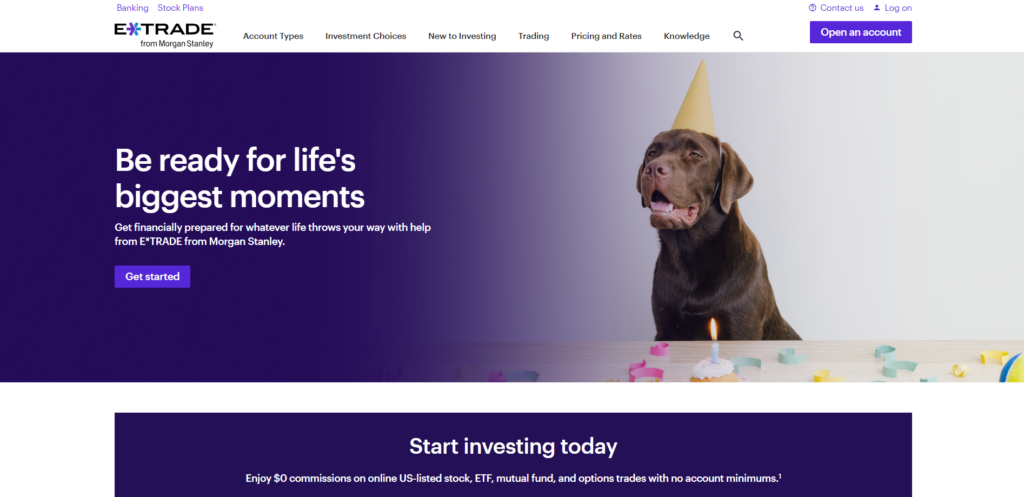
Image source: E*Trade
E*Trade, with its $0 commissions for stocks and ETFs, stands out as one of the premier brokers for novice investors seeking an excellent trading platform and a diverse range of investment options. E*Trade provides a broad spectrum of account types, making it a well-rounded brokerage that caters to the majority of investors’ requirements.
For those new to investing, E*Trade offers an exceptional collection of tools and educational resources, facilitating a responsible start to investing. Notably, unlike some other online-based brokers, E*Trade boasts a physical branch network, offering beginners the option of in-person assistance if needed.
Pros:
- Engaging features and tools that can be quite addictive.
- The online POWER E*TRADE excels in catering to newbie traders.
- Provides Morgan Stanley with thorough research.
Cons:
- Does not support cryptocurrency trading.
- Live data necessitates a $1000 minimum balance in the account.
- Experienced traders might lean towards downloadable desktop platforms.
3. JPMorgan
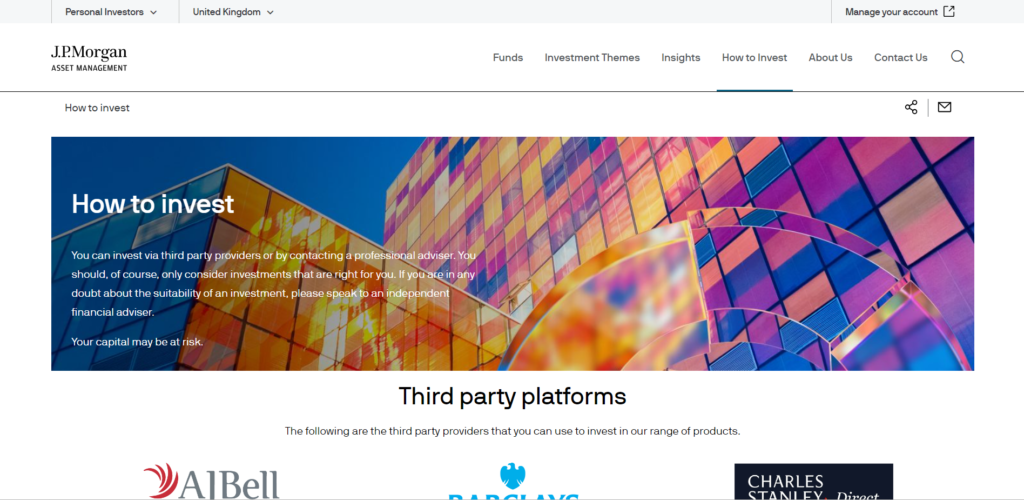
Image source: JPMorgan
If you’re new to investing, JPMorgan’s platform is designed with user-friendliness in mind, featuring $0 commissions, even on mutual funds. While most brokers have zero fees for transactions for commission-free investing in specific funds, JPMorgan’s rare offering of $0 commissions on all mutual funds sets it apart.
For existing Chase customers with bank accounts or credit cards, JPMorgan Self-Directed Investing proves to be a particularly appealing choice. The app consolidates the management of all Chase accounts in one place. Notably, J.P. Morgan extends its appeal with an excellent robo-advisor platform accessible through the app. This makes it an intelligent choice for beginners looking to automate some investments while still retaining control over their stock portfolio. If you’re in search of a beginner-friendly brokerage account, JPMorgan’s investing platform is worth considering.
Pros:
- JPMorgan Self-Directed Investing provides Chase Bank customers with a convenient avenue to invest in stocks, ETFs, options, bonds, and mutual funds.
- The firm is recognized among our top brokers for banking services in 2023.
- JPMorgan’s proprietary research often delves more deeply than the third-party research available through many other brokers.
Cons:
- The platforms offered by JPMorgan are basic, lacking the advanced tools preferred by serious investors and traders, who may find more sophisticated options elsewhere.
- Website navigation can be a source of frustration.
4. Merrill Edge
Merrill Edge, the online brokerage associated with Bank of America, offers a robust selection of $0 minimum investment options and research tools through a user-friendly platform. It proves to be an excellent choice for Bank of America customers, thanks to its seamless integration with the bank’s services and accessibility to various financial products.
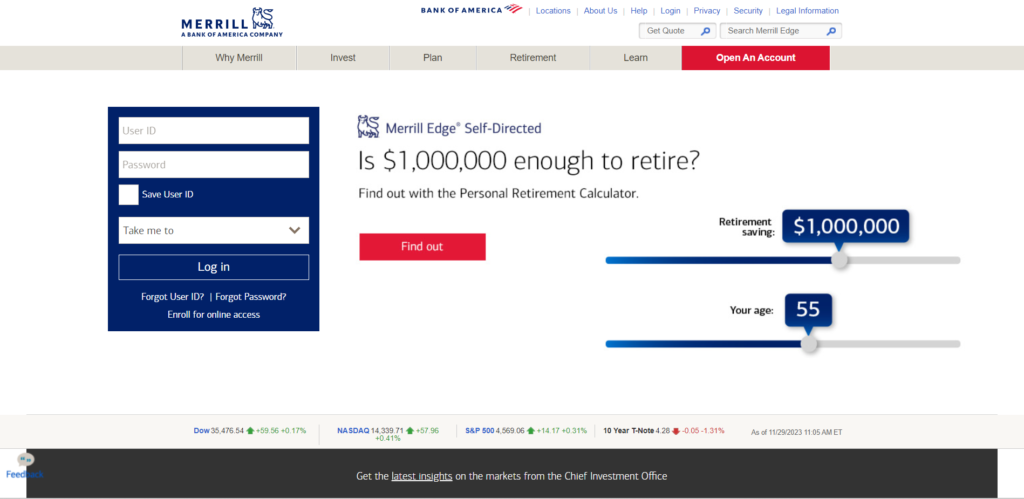
Image source: Merrill Edge
In collaboration with Morningstar, Merrill Edge presents an Investing Classroom featuring short courses covering funds, stocks, ETFs, bonds, and portfolio types. This feature contributes to its status as one of the best investing websites. Each course includes quizzes to assess your knowledge and reinforce your learning. Don’t overlook the webinar series, delving into topics ranging from financial psychology to sustainable investing.
The Tools section provides resources to assist in number-crunching for college planning, retirement goals, and general personal finance. Users also gain access to the BofA Research platform, offering market insights, analysis, and research reports from Bank of America.
Pros:
- Dynamic Insights, Portfolio Story, and the Fund and Stock Stories stand out as top features, especially for everyday investors who have benefited from $0 commission stock trades.
- Merrill Edge provides access to high-quality Bank of America Securities proprietary research.
- The platform boasts a premium design feel.
Cons:
- Certain site elements may experience delays in loading.
- Merrill does not offer services in cryptocurrencies, futures, foreign exchange, fractional shares, or paper trading.
5. Charles Schwab
An influential player in the brokerage landscape, Charles Schwab played a pivotal role in driving the industry toward lower-cost trading. To enhance accessibility, they eliminated trade commissions entirely in 2019! Moreover, their recent merger with TD Ameritrade brings together the best features and resources from both platforms.

Image source: Charles Schwab
Charles Schwab provides an extensive array of educational content through its Insights & Education section, covering investing strategies, market updates, retirement planning, and more. Schwab offers clients access to third-party research reports and tools, along with webinars, workshops, and online courses to enhance investor skills.
After the completion of the merger with TD Ameritrade, Schwab investors will gain access to courses and resources from its Education Center. Additionally, TD’s popular Thinkorswim platform, featuring paper trading and advanced technical analysis tools, will become available.
Pros:
- In contrast to numerous brokers emphasizing short-term trading, Schwab promotes a long-term perspective among its clients.
- Schwab introduced enhanced services and more favorable pricing for clients with higher net worth in July 2023.
- Investors and traders can access a comprehensive library of research and content at Schwab.
Cons:
- Cryptocurrency trading is not offered at Schwab.
- The fee structure for mutual fund transactions is needlessly intricate.
6. SoFi
SoFi stands out as an excellent broker for beginners, offering an outstanding user experience and combining investing, banking, and budgeting into one comprehensive platform. Unique features include fractional share investing and access to IPO investing for smaller investors.
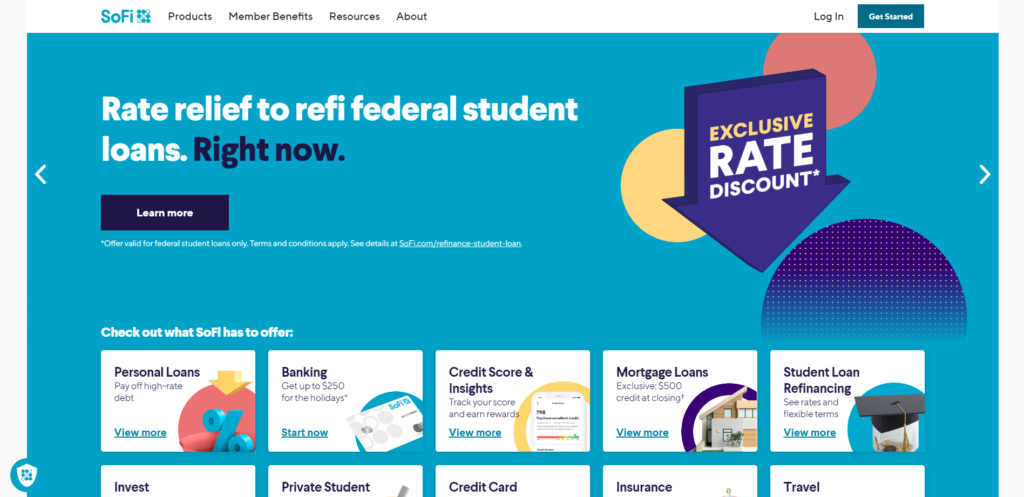
Image source: SoFi
SoFi distinguishes itself by providing commission-free options trading, emphasizing long-term responsible investing, and offering a variety of educational tools. These features make SoFi an ideal choice for both beginners and seasoned investors. Fractional shares enable investors to enter the stock market with just a few dollars.
SoFi’s user-friendly platform is particularly well-suited for those who find the stock market intimidating. SoFi also caters to retirement savers by offering IRAs, a feature not found in some other beginner-friendly brokerages. If you’re seeking an excellent online trading platform for beginners, SoFi is one of our top recommendations.
Pros:
- SoFi simplifies the process of saving, investing, borrowing, and insuring, providing a one-stop solution.
- SoFi clients enjoy a range of popular options for investments like ETFs, stocks, IPOs, crypto, automated investing, and stock options.
- SoFi stands out by offering 22 cryptocurrencies, surpassing numerous other brokers in the current market.
Cons:
- The platform does not provide open-ended individual bonds or funds.
- The asset charts are very basic, lack advanced features.
7. Ally Invest
A relatively recent player in the brokerage scene, Ally Invest proves to be a solid choice for individuals already engaged with Ally Bank seeking an uncomplicated way to extend their financial endeavors into the realm of investing.
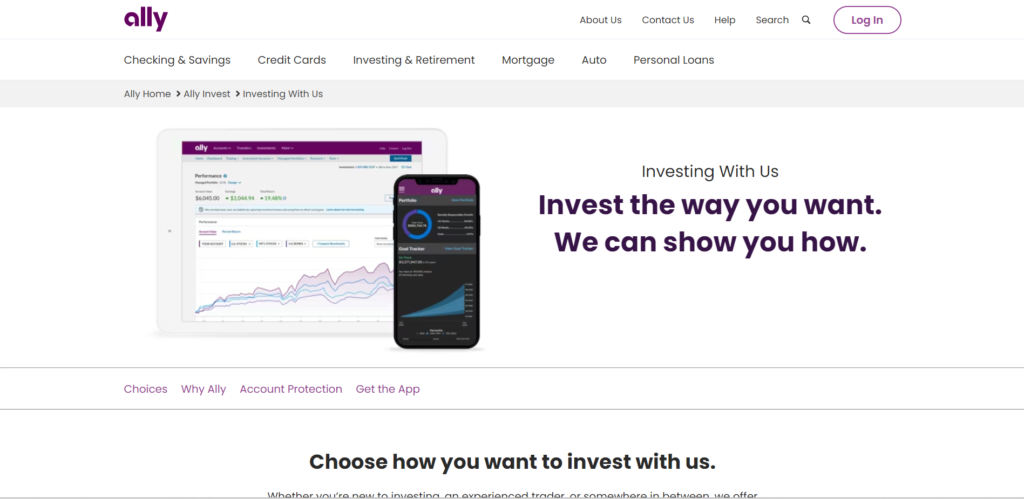
Image source: Ally Invest
The convenience extends to Ally’s mobile app, allowing users to access their accounts, receive quotes, and execute trades. Recognized for outstanding customer service and progressive digital banking features, Ally ensures a seamless transfer of funds between your bank and investment accounts.
Pros:
- When it comes to the integration of brokerage and banking combinations, Ally stands out by providing universal account access and facilitating instant money transfers between accounts.
- It is recognized as one of the best for banking services in 2023.
- Ally further impresses with a no-load $0 mutual fund trade. Particularly noteworthy for beginners, Ally’s trading ticket and options matrix offer enhanced usability.
Cons:
- While Ally Invest excels in certain aspects, its trading tools lag behind those of industry leaders such as Fidelity and Charles Schwab, albeit at a significant distance.
- Additionally, although Ally’s educational content is robust, it is somewhat concealed – not available in the app and challenging to locate on the website.
8. Vanguard
For those seeking the most cost-effective investment option, Vanguard emerges as a top contender. This prominent American fund management group has established itself as a discount online brokerage, offering unparalleled value on both sides of the Atlantic, whether you’re investing in a stocks and shares ISA or a brokerage account.

Image source: Vanguard
Investing in Vanguard’s LifeStrategy portfolios can cost as little as 0.22% annually, with a platform fee of 0.15%. While Vanguard may not provide extensive educational resources on its site, it shines for individuals with some existing knowledge. The LifeStrategy portfolios cater to various risk preferences, ranging from cautious to aggressive.
Pros:
- Extensive variety of mutual funds available.
- Commission-free trades for stocks, options, and ETFs.
- A recognized leader in offering low-cost funds.
- Competitive interest rate on uninvested cash.Maintains high-order execution quality.
Cons:
- Utilizes a basic trading platform.Provides limited research and data.
Conclusion
Selecting the best investment website for beginners requires careful consideration of factors like cost structure, account minimums, diversification of funds, and available account options. Fidelity impresses with its educational platform and comprehensive services. E*Trade stands out for its diverse investment options and user-friendly tools. JPMorgan’s platform is designed for user-friendliness, especially for existing Chase customers.
Merrill Edge, associated with BOA, offers seamless integration and a variety of educational resources. Charles Schwab provides extensive educational content, and SoFi stands out with its comprehensive platform. Ally Invest is a solid choice for Ally Bank customers, and Vanguard offers cost-effective investment options with a variety of mutual funds. Each platform has its strengths and considerations, catering to different preferences and needs in the dynamic landscape of online investing. If you want to be financially responsible and increase your earnings then start investing with these best investment websites.
Frequently Asked Questions
How to invest inexpensively?
To keep investing costs minimal, consider using a micro-investing app or a robo-advisor. These platforms, being largely automated, typically charge lower fees compared to traditional brokerage firms. If you opt for a traditional brokerage, it's essential to always check the fees before making any investment decisions.
Is it worthwhile to have a stock broker?
Certainly, though a full-service stock broker may not be necessary. Simply opening and funding an investment account with an online broker allows you to kickstart your investment journey. Through this account, you can purchase investments and execute trades on the stock market.
Is online investment secure?
Absolutely! Online trading is just as secure as offline trading, as financial transactions are always safeguarded.
How much does a stock broker cost?
Getting started doesn't require a significant amount of money. Many online stock brokers allow you to open an account with no initial deposit and charge zero commissions for trading stocks or exchange-traded funds (ETFs). This proves to be a cost-effective way to initiate the building of your investment portfolio.
How do brokerage accounts operate?
In a brokerage account, you deposit cash and utilize the funds to acquire investment assets like stocks, bonds, mutual funds, and exchange-traded funds (ETFs). These accounts serve both day trading for short-term gains and investing for long-term goals.

